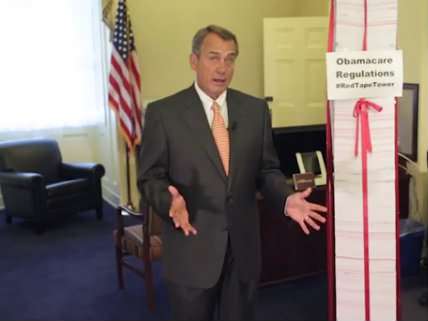Republican Grandstanders Have Committed Themselves to Defeat

The plan to defund Obamacare didn't defund Obamacare. And it's not going to.
This afternoon, the Senate is voting to close debate on a continuing resolution that cuts funding for the health law. After that, Senate Majority Leader Harry Reid (D-Nv.) will strike language cutting funding for the law. And then the bill will go back to the House, with Obamacare funding intact.
What the House will do then is still unclear, but there's essentially no chance that anything it does, including shutting down the government, results in the health law losing its funding.
This is not surprising. Indeed, it was inevitable. But it's still worth dwelling on for a moment, because the episode reveals a lot about the disarray, dysfunction, and legislative blundering of today's Republican party.
All summer long, a group of Republicans, led by Sen. Ted Cruz (R-Tx.), insisted that Republicans had to make a stand against the law by refusing to pass any government funding measure that included funding for Obamacare.
There was never any real chance of this working. The Senate, controlled by Democrats, wasn't going to pass a continuing resolution without funding for the health law. And even if they did, President Obama wasn't going to sign it.
Sen. Cruz never denied this. "If ordinary Washington rules apply, we can't win this fight," he said in July. The votes that would be necessary just weren't there. But he insisted that if Republicans fought on, they could bend political reality. "We are unlikely to get the votes in closed-door meetings in Washington," Cruz said. "The only way that we win this fight is if the American people rise up."
This week, Cruz rose up. He spoke for 21 hours—the fourth longest filibuster-like Senate speech on record. It was an impressive physical feat. And when Cruz engaged questions from Sen. Dick Durbin (D-Il.), an Obamacare supporter, it created a space for some of the most interesting congressional floor debate about the health care law since the law was passed.
But there was an odd sort of irony to the way the speech attacked other Republicans for casting symbolic votes against the law, and for, well, giving fiery speeches against the law that inevitably left it in place. And there was more than a bit of disconnect between Cruz's repeated exhortations to "make D.C. listen" and the fact that they came in the midst of a 21-hour talkathon.
Cruz wasn't listening. He was talking. And to a great extent, that's what this whole shutdown saga has been about—not defunding the law, but talking about defunding the law.
Former Republican Sen. Jim DeMint, now the president of the Heritage Foundation, which has been a key Cruz ally, said as much last month during a tour to stoke support for the defunding push. Sure, Harry Reid might not go along, he admitted. But "if the House passed [a defunding bill] and sent it to the Senate, it would give Republicans something to talk about that needs to be done."
What Republicans have right now is a lot of talk. What they don't have is a workable legislative strategy. Not on Obamacare. Not on the debt. Not on tax reform, the unsustainable entitlement state, or on any of the big domestic policy issues that Republicans say they care about, or that actually confront the nation today.

Part of coming up with a plausible strategy is going to be recognizing that right now, the GOP is the minority party in Congress, and that there are limits to what it can meaningfully accomplish until that changes.
Part of the trick will be to work effectively within those limits, exploiting clear opposition weak points and pushing for narrow victories that stand some change of being accomplished. Another part will be to build a clear and compelling long-term case for better alternatives.
(Recent reports suggesting that the GOP may opt to attempt to kill the health law's medical device tax, which is unpopular with some Democrats, and address the way Obamacare treats health benefits for members of Congress seem to better fit the bill. But wouldn't these concessions have been easier to extract if they were not chaotically tacked on at the last minute?)
But what Cruz and many of his allies in the defunding fight have done is just the opposite. They have gone big—on rhetoric, on theatrics, on policy requests. And they have stoked demand for grand showdowns amongst many of their supporters, making it harder for those who might prefer more targeted battles to proceed. They're getting the showdowns. But they're not getting much else.
Right now the GOP has no strategic or tactical savvy. Instead, the party has a surfeit of bluster.
The appeal of such aggressive tactics is perhaps understandable given the Obama administration's deeply frustrating policy choices. But they would be far more appealing if they offered any chance of victory. What the failed defunding fight makes clear is that there's little if any substantive advantage in this approach.
Republicans have said over and over that they are determined to fight Obamacare, and reduce the debt, and hold down government spending. But by opting for meaningless talk and poorly chosen, poorly planned showdowns, they have actually committed themselves to losing.


Show Comments (382)